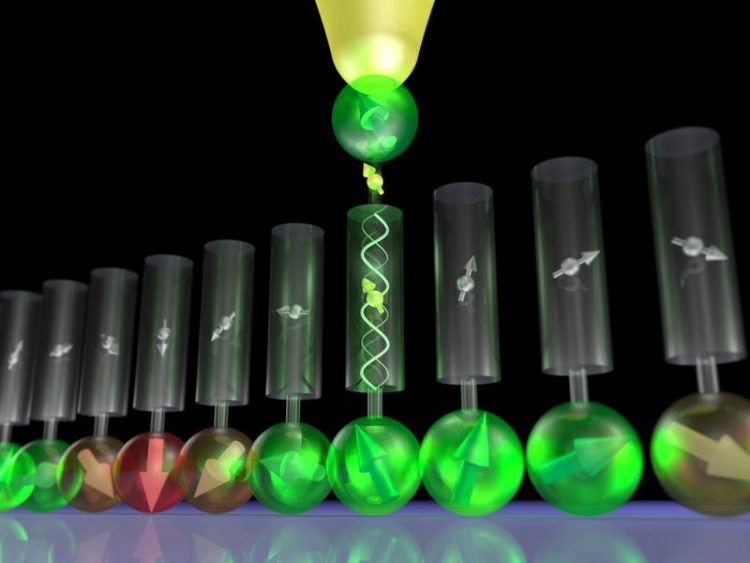Building an atomic-scale vacuum trap for spin-polarized electrons

Artist’s view of the injection of spin-polarized electrons into a vacuum trap formed between an atomically sharp tip and magnetic atoms on a surface. S. Krause, University of Hamburg
They placed an atomically sharp magnetic probe tip in front of a magnetic sample surface, thereby realizing a one-dimensional trap for electrons in the gap.
Only when resonance conditions in terms of electron energy and spin are fulfilled, standing wave states evolve in the trap, and injection of spin-polarized electrons into these states allows for the investigation of single electron reflection at the underlying atom at the surface.
Providing unprecedented insights into the atomic-scale scattering mechanism, the study potentially paves the way towards future spintronic devices employing spin-dependent electron scattering and transport.
Dr. Anika Schlenhoff
Department of Physics
University of Hamburg
Phone: +49 40 42838 6201
E-Mail: aschlenh@physnet.uni-hamburg.de
Prof. Dr. Roland Wiesendanger
Department of Physics
University of Hamburg
Phone: +49 40 42838 5244
E-Mail: wiesendanger@physnet.uni-hamburg.de
A. Schlenhoff, S. Kovařík, S. Krause, and R. Wiesendanger,
Vacuum resonance states as atomic-scale probes of noncollinear surface magnetism,
Phys. Rev. Lett. 123, 087202 (2019).
DOI: 10.1103/PhysRevLett.123.087202
Media Contact
More Information:
http://www.nanoscience.deAll latest news from the category: Physics and Astronomy
This area deals with the fundamental laws and building blocks of nature and how they interact, the properties and the behavior of matter, and research into space and time and their structures.
innovations-report provides in-depth reports and articles on subjects such as astrophysics, laser technologies, nuclear, quantum, particle and solid-state physics, nanotechnologies, planetary research and findings (Mars, Venus) and developments related to the Hubble Telescope.
Newest articles

First-of-its-kind study uses remote sensing to monitor plastic debris in rivers and lakes
Remote sensing creates a cost-effective solution to monitoring plastic pollution. A first-of-its-kind study from researchers at the University of Minnesota Twin Cities shows how remote sensing can help monitor and…

Laser-based artificial neuron mimics nerve cell functions at lightning speed
With a processing speed a billion times faster than nature, chip-based laser neuron could help advance AI tasks such as pattern recognition and sequence prediction. Researchers have developed a laser-based…

Optimising the processing of plastic waste
Just one look in the yellow bin reveals a colourful jumble of different types of plastic. However, the purer and more uniform plastic waste is, the easier it is to…


